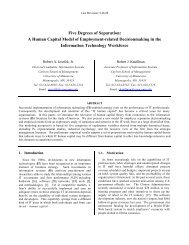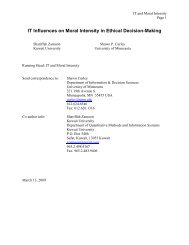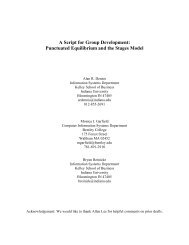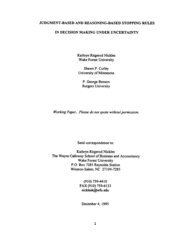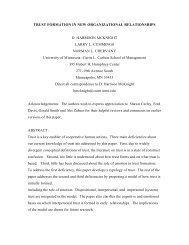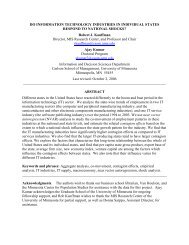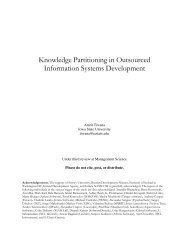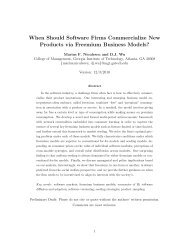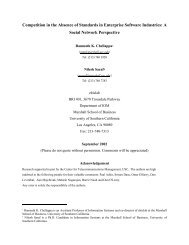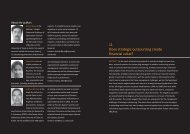The Digital Divide: Current and Future Research Directions - MISRC ...
The Digital Divide: Current and Future Research Directions - MISRC ...
The Digital Divide: Current and Future Research Directions - MISRC ...
You also want an ePaper? Increase the reach of your titles
YUMPU automatically turns print PDFs into web optimized ePapers that Google loves.
impacts of Web skills, as opposed to Web access (see the article by Hargittai 2006 in a<br />
future special issue of the journal).<br />
RECOMMENDATION 10: <strong>Research</strong>ers should examine the second order<br />
digital divide at the global level, <strong>and</strong> investigate what complementary policies <strong>and</strong><br />
investments are required for the productive use of ICT.<br />
<strong>The</strong> policy implications of the digital divide at the global level have not been<br />
sufficiently studied. To the extent that there are obvious network effects associated with<br />
larger penetration of ICT, there is a role for government policy <strong>and</strong> regulation. For an<br />
example of network effects, consider the growing prevalence of e-government, whereby<br />
citizens <strong>and</strong> companies have access to a whole host of services via the Web (e.g., permits,<br />
licenses, tax payments, etc.). As long as most citizens do not have access to the Web,<br />
local, city, state <strong>and</strong> federal governments cannot fully exploit the interactive capabilities<br />
of the Web, <strong>and</strong> must maintain multiple physical distribution channels (such as offices<br />
<strong>and</strong> paper forms), which is clearly inefficient. Policy levers for effecting more<br />
widespread adoption of computers <strong>and</strong> Internet include regulation of the IT <strong>and</strong> Internet<br />
industries, as well as their prices <strong>and</strong> products. As discussed above, restrictions on entry<br />
<strong>and</strong> ISP pricing have generally constricted penetration of the Internet <strong>and</strong> higher access<br />
prices. From a research perspective, a key question is to analyze the extent to which the<br />
governments should subsidize access <strong>and</strong> use of computers <strong>and</strong> the Internet ⎯ or leave it<br />
to market forces.<br />
RECOMMENDATION 11: <strong>Research</strong>ers should examine the policy<br />
implications of the digital divide at the global level, including the key questions of<br />
whether to subsidize access to ICT, <strong>and</strong> how best to promote the skills that are<br />
complementary to the productive use of ICT.<br />
As cross-border trade <strong>and</strong> offshoring increase in importance, the potential<br />
network effects of technology adoption <strong>and</strong> use cut across borders <strong>and</strong> even continents.<br />
This phenomenon raises important policy implications not just for internal governments<br />
but for external constituencies as well, such as global trading partners, technology<br />
vendors, <strong>and</strong> aid organizations. For example, how should multinational technology<br />
vendors price their products <strong>and</strong> services to best exploit the multi-sided network effects<br />
described above? Also, what are the implications for the formulation of tariffs <strong>and</strong> trade?<br />
41



